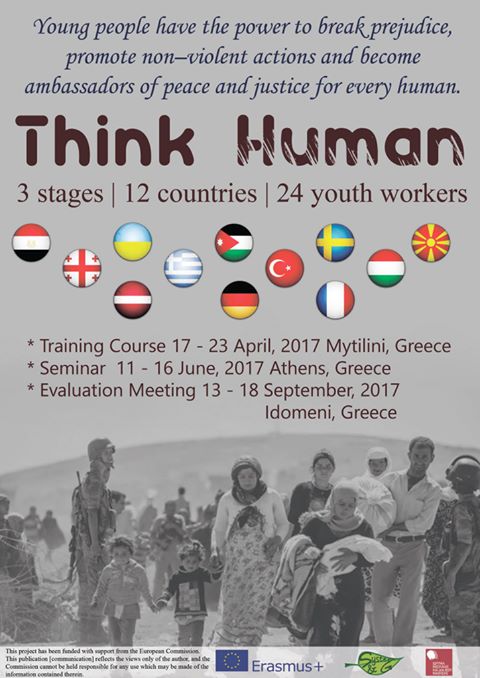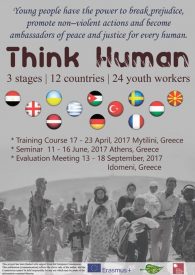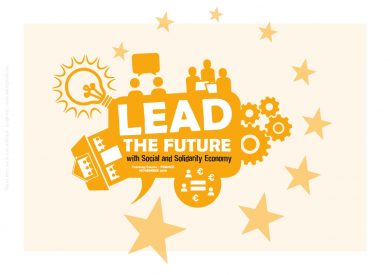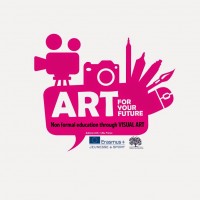

Call For French Participants! “Think Human!”




European training Ι Social & Solidarity Economy Ι november 2016 Ι Lille
The “Lead For Future” Training Course took place from the 19th to the 27th of November 2016. The programme of this training course about Social & Solidarity Economy (SSE), included exchanges on situation at the European level and in differents countries, visit to local structures, project management and networking.
The idea of this training was to gather European youth actors, volunteers, entrepreneurs to speak about SSE and build collective project in team. It looks simple like that but it’s not. First, we had to agree about what SSE and introduced it because we had differents understandings for the same topics and some didn’t really know the basic principle.
After a day of introduction and exchanges, we started working. The participants from Poland, Germany, Italy, England and France get to know each other quite well which avoided a diplomatic conflict between nationalities and allow us to work together no matter the country we were from. In the afternoon the participants gathered according to their interest to set up working groups. In the evening, the City of Lille welcomed us, with few words from Marie-Pierre Bresson, Lille City Councellor on International Relations, as they were partner of this training.
On Tuesday and Wednesday’s morning, the group went to visit local structures that focused on SSE (la tente des glaneurs, a social and solidarity grocery store called la passerelle, NASDAQ, ENERCOOP, GECO, Les Blongions…). It was really interesting visits that gave many ideas to some participants for specific projects. The afternoons, they worked on their projects.
There were 6 groups working on differents projects : an urban farm, a youth center, an energy self-sufficient community, citizen workshops, a social inclusion association and an outdoors cultural place.
The Thursday morning, we refined the projects and the afternoon we had to think how to present it on a public event the next day. In the evening, the intercultural evening took place; the participants could bring with them foods and/or drinks to share it with everybody. For the french team, we made them try small typical stuff from our region (cheese, “saucisson”…)
The Friday, the morning was free for everybody. It was more or less hard for everyone to be fit. Some of them ended up the night really early (I mean at 4 A.M) and some presentations weren’t totally prepared.
At about 2h30 PM, the public presentation could begin; the jury was here and the presentations ready. After few words of Christiane Bouchart, the Lille City Councillor on SSE and an introduction by Kenneth Guiguer, the groups started to present their project. It should last about 10 minutes but in some case (I mean for everyone) it lasted 20 minutes. So we were kind of late. But we can’t really predict this kind of thing as people were really enthousiasts about interesting projects.
The evening, we ate at a restaurant to celebrate it. And after the dinner some people prefered going “home” and some in bars (which is I think the best cure for insomnia…)
The next day, we were, I guess, quite tired of this week, really full of stuff (and emotion I guess – I’m not pointing someone – but I’m not Big Brother so I’m not aware of everything. Yet…). Then, we made a introduction about the Erasmus + programme and the non-formal education. We exchanged and evaluated this week and mentioned future meetings. Then we had a free time until 7h30 PM to eat at a restaurant. Some people went on a walk in Lille, some to rest at the Hostel (What about me? Well walking in a city crowded with sheep, humm… I mean people who bought stuff because of the Black Friday I went ASAP home).
At the restaurant, we gave the participants their Youth Pass diploma and a gift after a copious dinner. For the last evening participants and the presents trainers went to some bars (What about me again? I say farewell and went home you know like the stereotypical cowboy who ride to the setting sun).
In short, it was a really nice week but really tiring because of lot of discussions on specific topics (in English, obviously). For the whole crew, this week gone well and they went home enthousiastics to develop SSE projects, with a new network and amazed by Lille. Appointement is given for the next year in Leeds or Torino ?
Hugo Triffault, Civic Service

European Training Ι non-formal Education , artistic practices Ι Novembre 2016 Ι Marchiennes
The Art for the Future Training Course took place from the 15th to the 23th of October and was about non formal education through visual arts. The program included discussion about professional experiences and artistic workshops: photography, graphical art and video.
Based on a theme, the mobility, the participants had to use visual arts to talk about it.
But what is the point of this training ? In fact, participants came from differents places in Europe. They were 28 Youth workers, volunteers, Youngsters … from Romania, Latvia, France, Italy, Greece, Spain & Slovenia. They all had a different ages, came from different backgrounds, etc. Then, it became interesting, how should we work together with so many different persons that speak different languages ?
To start, the two first days we played some games to introduce ourselves and to know each others a little more. And this worked very well.
About the language barrier, almost everybody spoke english, with exceptions but we always succeed in understanding each other using another language, patient translators, hands and smiles…
How workshops took place ?
As already mentionned, there were three workshops (half day) for three days. The participants could choose quickly in which workshops they wanted to be.
The workshops explanations were made a day before with the rest of the week program in order to give a chance to everyone, to discover every technics.
In video, photography and visual art, three professional trainers led their own workshops. As experts, they taught the participants the technics and process used during the workshops. And they collectively created photo, video, draws… Whether it was technics about green screen, stop-motion, light graph, pinhold or imaginary maps everythings was explained to allow participants to used what they learned, back in their homeland.
But the real strength of the group didn’t took place during the workshops also. Indeed, the mealtimes allowed people to get closer outside work hours. Some events also happened at the end of the evening. One was called the french night and the other one was called intercultural exchanges where the participants could taste traditionnal products from differents countries. And indeed some, others evenst happened but were less formal.
All of these events led some people to oversleep and led to some romances (proof that integration worked very well).
After three days of workshops, we organized an exhibition, the ultimate achievement of all this work.
We had to think about the way to design the youth hostel where we were living, in an exhibition place. Some rooms were totally changed, some less but in general all the living space was set in a special way.
The exhibition took place – and I won’t say anything about the number of visitors who saw it in order to avoid decreasing the prestige of all the project – and we received good critics.
Proud of a hard but interesting work and after a week spend together, we discussed about what we expected during this training, our fears and the best moments we had together. In general everything was fine, some people cried (real men don’t cry!) because we knew that the training was almost over.
The last evening was nice even if shorter than the previous one due to the early bus on Sunday morning to go back to Lille.
So on the morning in Lille, some took the train, others the bus to go back home. For sure, saying goodbye was memorable (again some people cried but I won’t make any comments about it otherwise people will call me horrible person).
Anyway, if someone asked me to participate to another kind of this experience, definitly I would say yes.
Hugo Triffault, civic service